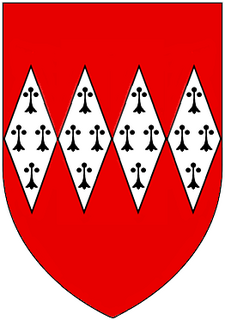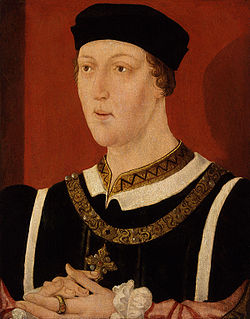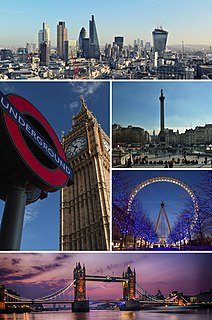
Edward IV was the King of England from 4 March 1461 to 3 October 1470, and again from 11 April 1471 until his death. He was the first Yorkist King of England. The first half of his rule was marred by the violence associated with the Wars of the Roses, but he overcame the Lancastrian challenge to the throne at Tewkesbury in 1471 to reign in peace until his sudden death. Before becoming king, he was Duke of York, Earl of March, Earl of Cambridge and Earl of Ulster.

Richard Neville, 16th Earl of Warwick, known as Warwick the Kingmaker, was an English nobleman, administrator, and military commander. The eldest son of Richard Neville, 5th Earl of Salisbury, Warwick was the wealthiest and most powerful English peer of his age, with political connections that went beyond the country's borders. One of the leaders in the Wars of the Roses, originally on the Yorkist side but later switching to the Lancastrian side, he was instrumental in the deposition of two kings, which led to his epithet of "Kingmaker".

Edward of Westminster, also known as Edward of Lancaster, was the only son of King Henry VI of England and Margaret of Anjou. He was killed at the Battle of Tewkesbury, making him the only heir apparent to the English throne to die in battle.

Francis Lovell, 9th Baron Lovell, 6th Baron Holand, later 1st Viscount LovellKG was an English nobleman who was an ally of King Richard III during the War of the Roses. Sir William Catesby, Sir Richard Ratcliffe and he were among Richard's closest supporters, famously called "the Cat, the Rat and Lovell our dog" in an anti-Ricardian squib. In addition to being an ally, Lovell is attributed as Richard's best friend.

John Bourchier, 2nd Baron Berners was an English soldier, statesman and translator.
Sir Thomas Tresham was a British politician, soldier and administrator. He was the son of Sir William Tresham and his wife Isabel de Vaux, daughter of Sir William Vaux of Harrowden. Thomas's early advancement was due to his father's influence. In 1443 he and his father were appointed as stewards to the Duchy of Lancaster's estates in Northamptonshire, Buckinghamshire, Bedfordshire and Huntingdonshire, and by 1446 Thomas was serving as an esquire for Henry VI, being made an usher of the king's chamber in 1455. He was appointed a Justice of the Peace for Huntingdonshire in 1446, a position he held until 1459, and was returned to Parliament for Buckinghamshire in 1447 and Huntingdonshire in 1449. Despite the Tresham family's close links with the royal court they were also on good terms with Richard Plantagenet, 3rd Duke of York, and when he returned from Ireland in 1450 Tresham and his father went to greet him. Shortly after leaving home on 23 September they were attacked by a group of men involved in a property dispute with his father; William Tresham was killed, and Thomas was injured.

Richard Pynson was one of the first printers of English books. The 500 books he printed were influential in the standardisation of the English language. Pynson, whose books make him technically and typographically the outstanding English printer of his generation, is credited with introducing Roman type to English printing.

The Year Books are the modern English name that is now typically given to the earliest law reports of England. Substantial numbers of manuscripts circulated during the later medieval period containing reports of pleas heard before the Common Bench. In the sixteenth century versions of this material appeared in print form. These publications constituted the earliest legal precedents of the common law. They are extant in a continuous series from 1268 to 1535, covering the reigns of King Edward I to Henry VIII. The language of the original manuscripts and editions was either Latin or Law French. Maitland and others have considered that the medieval manuscripts were compiled by law students, rather than being officially sanctioned accounts of court proceedings.

Walter Devereux, jure uxoris 7th Baron Ferrers of Chartley, Knight of the Garter, was a member of the English peerage and a loyal supporter of the Yorkist cause during the Wars of the Roses. He was a member of the inner circle of King Edward IV of England, and died fighting for Edward's younger brother, King Richard III, at the Battle of Bosworth (1485).
Events from the 1450s in England.
Events from the 1460s in England.

Thomas de Courtenay, 5th/13th Earl of Devon was a nobleman from South West England. His seat was at Colcombe Castle near Colyton, and later at the principal historic family seat of Tiverton Castle, after his mother's death. The Courtenay family had historically been an important one in the region, and the dominant force in the counties of Devon and Cornwall. However, the rise in power and influence of several gentry families and other political players, in the years leading up to Thomas' accession to the earldom, threatened the traditional dominance of the earls of Devon in the area. Much of his life was spent in armed territorial struggle against his near-neighbour, Sir William Bonville of Shute, at a time when central control over the provinces was weak. This feud forms part of the breakdown in law and order in England that led to the Wars of the Roses.
Lady Eleanor Beauchamp, Baroness de Ros and Duchess of Somerset at Wedgenock, Warwickshire, England, was the second daughter of Richard de Beauchamp, 13th Earl of Warwick and Elizabeth de Berkeley, daughter of Thomas de Berkeley, 5th Baron Berkeley.

John Dynham, 1st Baron Dynham of Nutwell in the parish of Woodbury and of Hartland, both in Devon, was an English peer and politician. He served as Lord High Treasurer of England and Lord Chancellor of Ireland. He was one of the few men to have served as councillor to Kings Edward IV, Richard III and Henry VII and was trusted by all of them.

Sir Maurice Denys (1516–1563) of St John's Street, Clerkenwell, London and Siston Court, Gloucestershire, was an English lawyer in London and a property speculator during the Dissolution of the Monasteries, during which period he served as a "powerful figure at the Court of Augmentations". He served as Member of Parliament for Malmesbury in Wiltshire and as Treasurer of Calais. He was the builder of Siston Court in Gloucestershire, which survives largely unaltered since his time.
Ans du Roy Richard II., hors des les Abridgments de Statham, Fitzherbert et Brooke is the title of a collection of law reports, compiled by Richard Bellewe, of cases decided between approximately 1378 and 1400. For the purpose of citation their name may be abbreviated to "Bel". They are reprinted in volume 72 of the English Reports.
Ascuns novel cases de le ans et temps le Roy H. VIII., Edv. VI, and la Roygne Mary. Escrie ex la graund Abridgment, compose per Sir Robert Brooke, Chivaler, &c., la, disperse en les Titles; mes icy collect sub ans is the title of a collection of law reports, compiled by Richard Bellewe, of cases decided between approximately 1515 and 1558. They are reprinted in volume 73 of the English Reports.

Mohuns Ottery or Mohun's Ottery, is a house and historic manor in the parish of Luppitt, 1 mile south-east of the village of Luppitt and 4 miles north-east of Honiton in east Devon, England. From the 14th to the 16th centuries it was a seat of the Carew family. Several manorial court rolls survive at the Somerset Heritage Centre, Taunton, Somerset.















